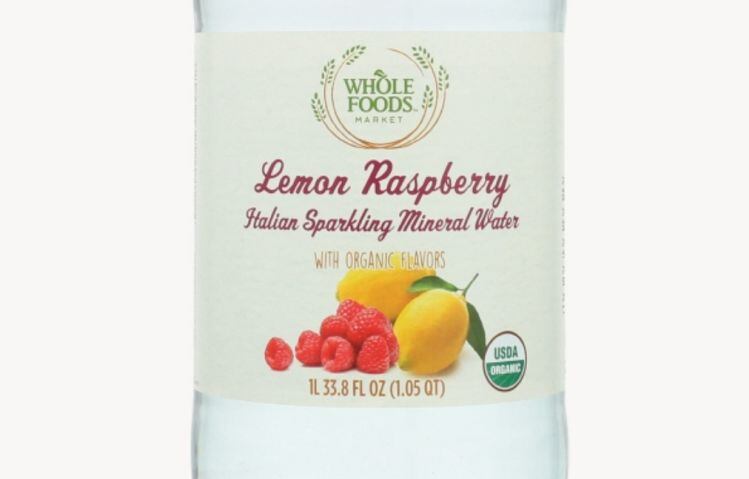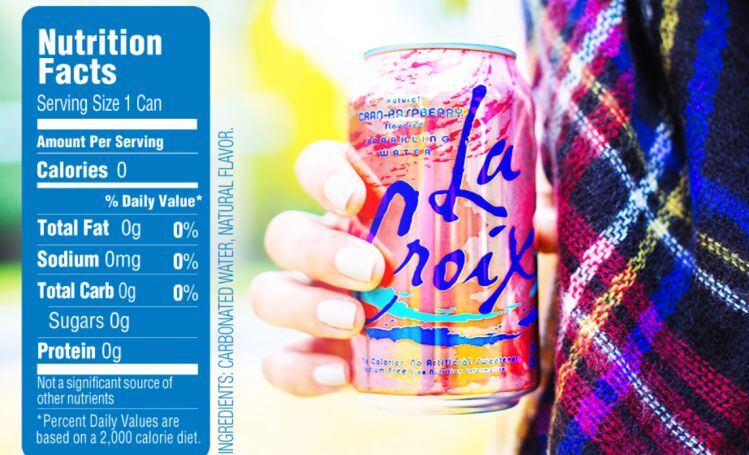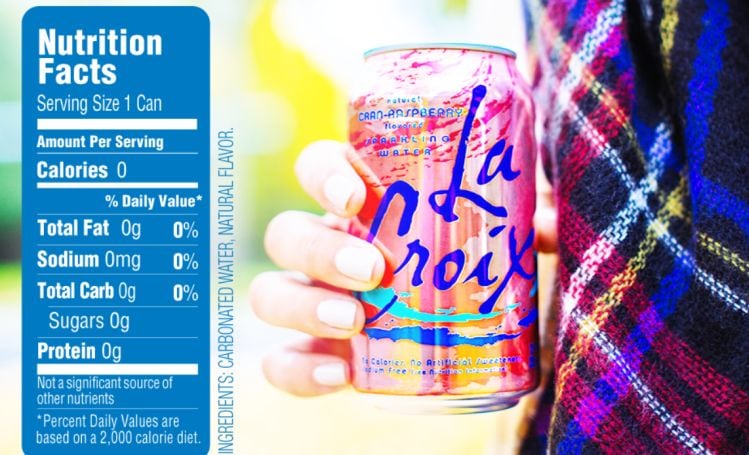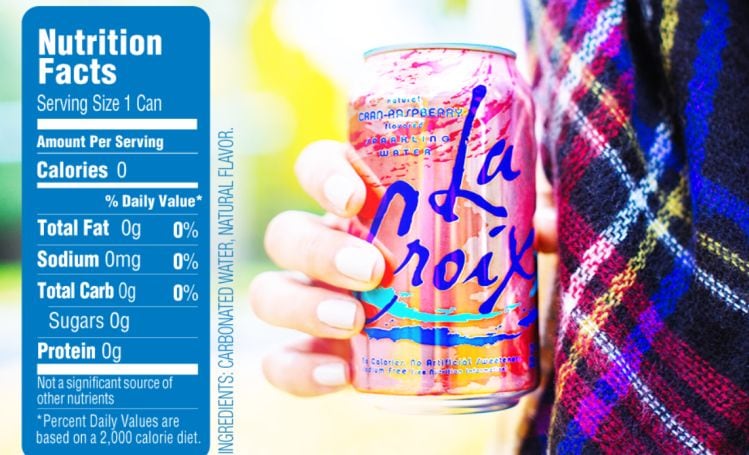The label on the bottles from Whole Foods - which told us that it doesn’t comment on pending litigation - mirrors the label of most flavored waters on the market, from Clearly Canadian to Nestle Splash, featuring images of lemons and raspberries coupled with the wording, ‘Lemon Raspberry Italian Sparkling Mineral Water with organic flavors.’
The ingredients list on the back of the pack lists ‘carbonated mineral water’ and ‘organic natural flavors (raspberry, lemon).’
Plaintiff: ‘Consumers will expect the presence of a non-de minimis amount of lemon and raspberry ingredients, based on the pictures of these fruits…’
Sheehan - who has sued scores of food and beverage companies in recent years from emerging or challenger brands such as Forager Project, Halo Top, RXBAR and That’s It, to CPG giants including Conagra and Nestlé, over everything from underfilled pints to ‘made with real milk’ claims - makes the argument that the label is setting up expectations that are not being met in a lawsuit* filed April 11 in New York.
Consumers viewing the bottle “will expect the presence of a non-de minimis amount of lemon and raspberry ingredients, based on the pictures of these fruits,” argues the complaint.
“The representation as ‘Lemon Raspberry,’ coupled with the images of the fresh lemons and raspberries, is false, deceptive and misleading because the Product lacks an appreciable amount of these ingredients.”
The lawsuit cites “lab analysis” that “indicates the use of less real lemons and raspberries than consumers will expect…” and speculates that the company most likely used natural flavors that combined a bunch of compounds from a variety of natural sources, but only a ‘de minimis’ amount of lemon and raspberry.
It also argues that consumers “value lemons and raspberries for their nutritive purposes” and are therefore being misled because they’re not getting any health benefits from the product.
Kantha Shelke: The label should say 'Lemon Raspberry flavored...'
Kantha Shelke, PhD, CFS, food scientist and principal at food science and research firm Corvus Blue LLC and senior lecturer, food safety regulations at Johns Hopkins University, told FoodNavigator-USA that, "The label, as is, implies that it contains Lemon Raspberry and organic flavors.
"It appears that the flavoring ingredients are made from non-lemon and non-raspberry materials which contain lemon and raspberry. This is akin to a crabcake-like product made with fake crab to which a small amount of crab has been added.
"To accurately reflect the contents of the product, the label should say 'Lemon Raspberry flavored…'…for the lemon and raspberry are contained in the flavor mixtures."
Attorney: The product is clearly labeled as ‘mineral water
So what do defense attorneys make of Sheehan’s latest line of attack vs food & beverage? Is this lawsuit grasping at legal straws, or is Whole Foods raising expectations among consumers that its product fails to deliver?
While some similar cases have survived motions to dismiss (eg. Silva v. Unique Bev. Co. over coconut sparkling water that allegedly contained no coconut), this lawsuit isn't actually arguing that the product contains no lemon or raspberry, just that it contains a 'de minimis' amount, said attorneys we spoke to, who predicted Sheehan might struggle to make headway.
“When we first read about this, we assumed it was a poorly executed April Fool’s prank since the filing date was April 11,” said Ivan Wasserman, managing partner at law firm Amit Talati Wasserman.
“Apparently we were wrong. This is farther fetched than if my dog Frankie retrieved a toy I threw to Madagascar. The product is clearly labeled as ‘mineral water,’ not raspberry lemonade.
“In the incredibly unlikely case that any Whole Foods customer does not know what ‘mineral water’ is, through the clear bottle they can see that the bubbly water inside is crystal clear, tipping them off to the absence of an appreciable amount of fruit. While of course you never know, the theory of this case should soon lose its fizz.”

“People buy sparkling water precisely because it is what it purports to be… it strikes me as a class that will face extraordinary challenges to certify, particularly since I suspect most other putative class members do not share the unreasonable expectations alleged of this plaintiff. This feels like a stretch to me, and a lawsuit that ultimately will not succeed on the merits if it gets that far.”
Adam Fox, partner, Squire Patton Boggs
'Incredibly far-fetched'
Ryan Kaiser, managing partner at law firm Kaiser IP, said the complaint is "interesting because the plaintiff does not contest whether the named ingredients are in the product. Rather, that consumers would expect an 'appreciable' amount of those ingredients."
Given the nature of the product and it’s packaging, however, Kaiser has "serious doubts that any consumer would be misled into buying flavored sparkling water for the nutritive benefits associated with its flavoring ingredients. For example, the allegations suggesting that consumers might purchase this product to reduce the risk of stroke or support strong bones seem incredibly far-fetched.
"I strongly suspect that any consumer who purchased flavored sparking water for the health benefits of the characterizing flavor ingredient would be atypical, which would make class certification incredibly difficult (I also doubt anyone is buying Starburst fruit chews to prevent scurvy)."
'It seems a stretch...' but some courts have allowed such cases to go past the pleading stage
Angel Garganta, partner and co-chair at Venable's class action defense group, added: "This is one of the many cases filed by the Sheehan firm alleging that there is not enough of a particular flavor ingredient (e.g. vanilla, cheese, sour cream, smoke, lemon, lime) in food products depicting that ingredient on the principal display panel."
A number of courts have dismissed his cases, reasoning that as long as the product contains some amount of the ingredient (as in this case), no reasonable consumer would believe that the food is flavored exclusively or mostly with that ingredient, he said. However, some courts have allowed these cases to go past the pleading stage.
"Given that this case is about flavored sparkling water, it seems a stretch to contend that consumers would expect much more than a 'de minimis' amount of lemons or raspberries in the product. Arguably, if it were intended to have more, the product would be called raspberry lemonade."
* The case is Kevin Kelly et al, v. Whole Foods Market Group, Inc., 1:21-cv-03124, in the United States District Court for the Southern District of New York.




